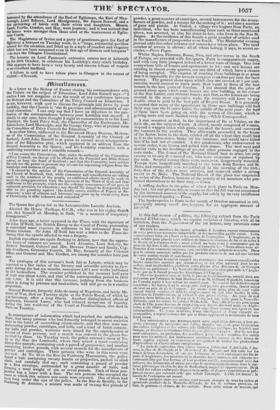Inisttlianeous.
In a letter to the Bishop of Exeter closing his correspondence with that Prelate on the subject of Education, Lord John Russell says—" I confess I am not sanguine as to the result of any conference between the Bishops and the Committee of the Privy Council on Education. I do not, however, wish now to discuss the principle laid down by your Lordship, that the Church is 'the fit guardian and administratrix of na tional education.' I can only say that I have no objection to the publication of the correspondence between your Lordship and myself. I
should, in any case, have thought it right to communicate it to the Lord President, the Lord Privy Seal, the Chancellor of the Exchequer, Mr. Labouehere, Lord Monteagle, and Sir George Grey, who at present form the Committee of Privy Council for Education."
In another letter, addressed to the Reverend Henry Duncan, Moderator of the Commission of the General Assembly of the Church of
Scotland, Lord John Russell is at pains to correct some misapprehensions of the Education plan, which appeared in an address from the General Assembly to the Queen ; and his Lordship concludes with a comforting assurance and a sensible remark— "I can assure the Commission, that, under the authority of the Committee of Privy Council, no change will be effected in the Parochial and Bible School ustem, so long the boast of Scotland ; and that the Committee have neither the wish nor the power to promote any scheme for separating religion from the knowledge and business of youth.
"It cannot be the opinion of the Commission of the General Assembly of the Church of Scotland, that, while commerce and manufactures are adding
yearly to the numbers of the people, no additional efforts should be made to secure the rising generation from the ignorance of the Word of God, and that indifference to his precepts, which arc the unhappy consequences of our presast
inadequate provision for education ; nor should the danger be disregarded, that while we are guarding against the deadly errors, whether of Popery or Socinianism,' a race of artisans and labourers may grow up by whom every form of Christianity is alike unknown and unheeded."


























 Previous page
Previous page